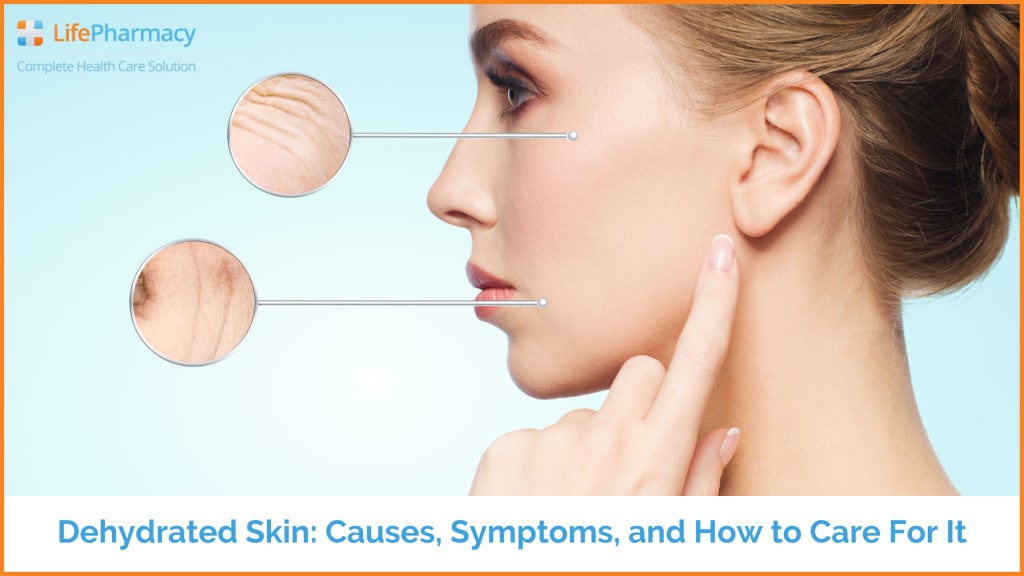Dehydrated Skin: Causes, Symptoms, and How to Care For It
Want to know how to care for dehydrated skin? Learn the best tips on hydrating your skin and keeping it healthy with the right products from UK online pharmacy.

Dehydrated skin can be an annoying problem for men and women of all ages. When the skin appears dull, dry, or tight, it can make us self-conscious about our appearance. Fortunately, there are treatments available to help restore our skin's natural moisture balance and get us looking and feeling better.
As we love our skin and hope for the best skincare to keep it hydrated and healthy, we need to understand our skin problems. So let's start with the causes, symptoms, and treatment of dehydrated skin.
What is Dehydrated Skin?
Dehydrated skin is often misunderstood; many think it refers to dry skin. However, all skin types can suffer from dehydration, not just those classified as 'dry.'
We all have different skin types - oily, normal, combination, or dry. But our skin type is never permanent. It changes with age, environmental conditions, and the weather. No matter your skin type, thirsty cells cause dehydration.
That's when they lack water. But, unlike skin that lacks water, dry skin is usually caused by underactive sebaceous glands. Put another way, your skin becomes dried out when your sebaceous glands don't have enough natural oils to keep your skin hydrated.
Similar to dry skin, dehydrated skin appears dull and flaky. However, if left unchecked, severe medical problems can arise from dehydrated skin--unlike dry skin.
Dry Skin vs. Dehydrated Skin:
Dry skin lacks oil and water, whereas dehydrated skin lacks water only. Dry skin can be caused by underactive sebaceous glands, while dehydrated skin is due to a lack of water. Dry skin is a skin type, while dehydrated skin is a condition that affects all skin types. Dry skin can usually be managed with over-the-counter products, whereas dehydrated skin requires more intensive topical treatments and lifestyle changes.
Dry skin is usually caused by an underlying condition, like hypothyroidism, while dehydrated skin tends to result from water loss through urination or sweating during exercise.
Signs and Symptoms of Dehydrate Skin
Although dry skin can show various symptoms, such as flakiness, itchiness, and discomfort, dehydrated skin signs may differ slightly. You might undergo the following signs and symptoms if you have dehydrated skin:
- Dull, sallow, or ashy appearance
- Uneven skin tone
- Tight feeling or stretched skin
- Flaky patches
- Redness, itchiness, or irritation of the skin
- Visible symptoms of aging, like wrinkles and fine lines
- Dark circles under the eyes
- Skin sensitivity
- Scaly and rough texture
Some effects of severe dehydration include:
- Dry mouth
- Fatigue
- Dizziness
- Headaches
- Lightheadedness
- Less frequent urination or dark yellow urine
- Weakness
If this is the case, seek medical awareness for proper treatment.
Ways To Determine If You Have Dehydrated Skin
The best way to check if your skin is dehydrated is by doing the pinch test. Here's what you need to do:
- Pinch is a small spot of skin on the back of your hand.
- Check if the skin bounces back or stays in place for a few seconds.
- If it doesn't bounce back, you likely have dehydrated skin.
If you want to know if you're dehydrated, there's another quick and easy test. When you press on your nail bed, it turns white from the lack of blood flow. Once you release the pressure, the blood returns and changes its color to its natural hue. When dehydrated, your nails take longer to turn pink or reddish again.
Related Reads: Vitamins and Minerals to Strenghten Yor Skin, Hair, and Nails.
Properly Caring for Dehydrated Skin
If you think that your skin is dehydrated and not dry, follow these steps to improve its hydration:
- Drink lots of water, but be sure to talk with your medic first to figure out how much is best for you, depending on your activity levels and body weight. And although it's important to stay hydrated, don't drink too much water, or you might start losing essential minerals from your body.
- Try to consume less caffeine.
- Quit smoking.
- Reduce your alcohol intake.
- Eat foods high in essential fatty acids like fish, nuts, and seeds.
- Avoid harsh skin care products.
In addition to altering your lifestyle, use the following tips to help improve the appearance of your dehydrated skin.
Exfoliate Regularly
When you don't exfoliate your skin, dead skin cells can build up and prevent moisture from being absorbed by your skin. To keep this from happening, be sure to exfoliate at least two times per week.
Use A Hydrating Serum
Before applying your moisturizer, use a hydrating serum to help lock in moisture. Serums are usually lightweight and have ingredients that can penetrate deep into your skin to provide all-day hydration.
Moisturize Often
A good moisturizer on your dehydrated skin is key to helping it feel hydrated and refreshed. Be sure to find an oil-based moisturizer that can help protect your skin's natural barrier.
Products that are too harsh on your skin can worsen dehydration. To maximize results, carefully select the best product from UK online pharmacy for your skin type.
Tips for Selecting the Right Skin Care Product
Always check the ingredients list when choosing products for your skincare routine. Some components can disturb your skin's natural balance and worsen existing conditions. To assist you, here are a few guidelines:
- Keep your skin healthy by avoiding products with harsh ingredients like peppermint, alcohol, menthol, and fragrances. These will only dry out your skin more.
- Avoid using abrasive scrubs and cleansing brushes as it hurts your skin.
- You should be careful not to use the wrong combinations of products. Although ingredients like vitamin C, AHA and BHA exfoliants, and retinol are perfect for your skin, using these products daily can make your skin look more dehydrated. Use them moderately instead.
- Use serum and moisturizers that are designed for dehydrated skin.
- Use mild cleansers that are free from soap and sulfates.
The Bottom Line
Dehydrated skin can be difficult to manage, so it is important to care for and treat it properly. Following these tips can help bring back your skin's natural hydration levels and enjoy a more healthy-looking complexion.
Remember that effective skincare is not about using the most expensive products but finding the right combination that can best help your skin. With the right knowledge, care, and products from UK online pharmacy, you can ensure that your skin remains hydrated and healthy for years to come.
About the Creator
Life Pharmacy
Life Pharmacy, the leading online pharmacy that provides services such as online NHS and Private prescriptions, weight loss, asthma inhalers, erectile dysfunction tablets and much more. Get in touch with us at our website to learn more.






Comments
There are no comments for this story
Be the first to respond and start the conversation.